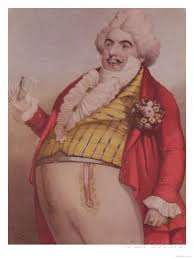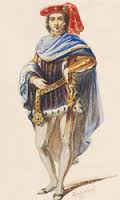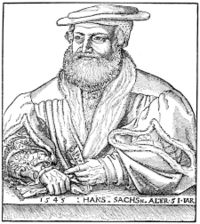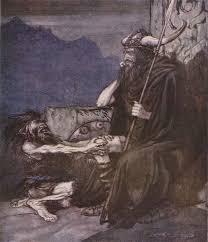 Anyone who has watched any of the Republican candidates’ debates, particularly the recent ones, has to have been amazed at the extreme statements, the antipathy, the crassness, and the violence of the tone, not to mention what the four remaining candidates want to do as President. American politics has always been rough, but even in the late nineteenth century, when strong words were the norm, never has there been the kind of personal invective viewed on television in the last few months.
Anyone who has watched any of the Republican candidates’ debates, particularly the recent ones, has to have been amazed at the extreme statements, the antipathy, the crassness, and the violence of the tone, not to mention what the four remaining candidates want to do as President. American politics has always been rough, but even in the late nineteenth century, when strong words were the norm, never has there been the kind of personal invective viewed on television in the last few months.
Opera might not be the first art form to come to mind watching these debates, but the players do suggest the melodramatic personages found in many operas.
Donald Trump has led the voting and the ratings thus far, and he is the easiest to compare to an opera character: Dr. Dulcamara in Donizetti’s Elixir of Love. Dulcamara travels to small Italian towns selling a potion that will cure all of a community’s ills. This elixir gives old people new life, frustrated lovers their desire, injured people a cure. There is nothing that his public wants that can’t be solved by Dr. Dulcamara. When confronted with the story of a love potion that when Tristan drank it, Isolde immediately and improbably fell in love with him, the good doctor convinces a gullible rustic that he has the very drink who will win him the woman he adores. The three equal divisions of the American system of government make Trump’s proposals about as much chance of being enacted as the red wine Dulcamara sells bringing what the buyer craves. But charlatans function as successfully in our world as they did in 1832 in Donizetti’s opera.
Senator Marco Rubio strikes me as a bit like Count Di Luna in Verdi’s Il trovatore. The Count loves Leonora just as much as the Senator wants to be President. The Count to all intents and purposes has his loyal followers. He fights battles successfully even though he sometime loses hand-to-hand combat. With Leonora though he fails again and again. He finds out early on that she loves someone else but keeps trying, seeking to take her by force, then by arms. When he thinks he has won her, she takes poison rather than yield. Certainly the parallel breaks down at this point, but Republican voters seem determined to reject Senator Rubio no matter how much he loves them.
John Kasich, the Governor of Ohio, has a lot of Hans Sachs in him, the favorite character of many in opera. The lovable Wagner hero of Die Meistersinger von Nuernberg has conservative ideas but he also hears the future. The melody of Walther’s Prize Song keeps running through his head hours after the young knight sang; Sachs knows it broke the rules of the singing guild, but it had quality. Similarly, the Governor will not join his colleagues in denying, for instance, global warming, just to please voters. He can look beyond his tradition in that one matter but not in many others. Just as Kasich worked successfully in the Congress as a Representative and now as Governor, Sachs understands both his guild’s traditions, its strengths and its weaknesses. Sadly, just as Sachs, estimable in so many ways, ends the opera with words that were used to fuel a lethal German nationalism, Kasich sticks by the Republicans’ war on women, on not raising taxes for those who enjoy a modern Gilded Age, and other standard GOP ideas.
The only opera character who strikes me as even vaguely suggestive of Texas Senator Ted Cruz can be found also in Wagner, this time in Götterdämmerung. Cruz and Hagen have a lot in common. No one who knows Hagen much likes him, and he is constantly working to gain world power. The golden ring Hagen seeks is clearly the Presidency for Senator Cruz. Hagen employs many shady tricks to get his way, seems to be completely honest and virtuous, is to his public and half-siblings a good fellow well met. He is particularly charming to Siegfried throughout, and the young hero never imagines his plan to destroy him. The big difference with Cruz is that the Senator tells us very clearly what he plans to do. Moral to the story: Brünnhilde wins.
All in all the candidates precisely suggest the cover of The New Yorker a few weeks ago in which Lincoln, Benjamin Franklin, FDR, Theodore Roosevelt, and Kennedy stand and sit aghast looking at a television screen with Trump speaking. George Washington summed up their reaction: he covered his eyes.





Absolutely brilliant!
Wonderful comparisons! And what about Hillary Clinton? Where do you think she fits in, operatically speaking?
I would say she is a cross between Brunnhilde and the Marschallin, after watching the polls last night. Maybe next week Queen of the Night?
Terrific analysis! Now for your operatic take on the Democrats ….
That´s really brilliant, Speight. I wish many people could approach operas not as an airy fairy tales with nice music but rather as a way of understanding how operatic characters reflect the people we happen to encounter in our everyday´s life. Then more enlightened politicians would be elected. There are lots of mr and mrs. Macbeths Fiescos and Paolos around. Even more worrying are the Basilios and Great Inquisitors with too much power over governors, congressmen and Supreme Court judges.
Wonderful pairings, Speight. I’ll never think of Dr. Dulcamara quite the same way again, even though I seriously doubt a Trump Administration would end as happily as Elixir does at the curtain.
If this election cycle, particularly the Republican production, is like an opera, I long for the last act. But “if it ain’t over till the fat lady sings,” I’m ready for that aria ASAP.
Speight, are your sure Donald Trump is not Bottom from the Britten Midsummer’s Night Dream?
I don’t agree. Bottom doesn’t willingly develop a donkey’s head. Dulcamara is what he is, and I think the same can be said for Donald Trump. And there is another reason: the donkey, like it or not, is the animal symbol of the Democratic party. I don’t want to be confusing.
Excellent analysis, Speight. The whole election campaign is a nightmare and I do hope it ends happily. It would if Teddy Roosevelt or Harry Truman were up for election.
Not that Donald Trump is your perfect Phillip, but a visit from The Grand Inquisitor might help.
Brilliant, Speight. I read your post yesterday and today one particular comment you made continues to resonate with me: Brünnhilde wins.
Absolutely brilliant political satire, though I still find some loveable traits in Dulcamara and none in his twin.
Totally brilliant! Of course I am not at all surprised…
….that is; what a splendid and quite accurate observation Mr Jenkins does!
Now that the unthinkable has happened in Cleveland, any further thoughts beyond Dr. Dulcamara? I am stumped trying to come up with someone awful enough – and can anyone picture the man with the trucker hat selling a love potion?